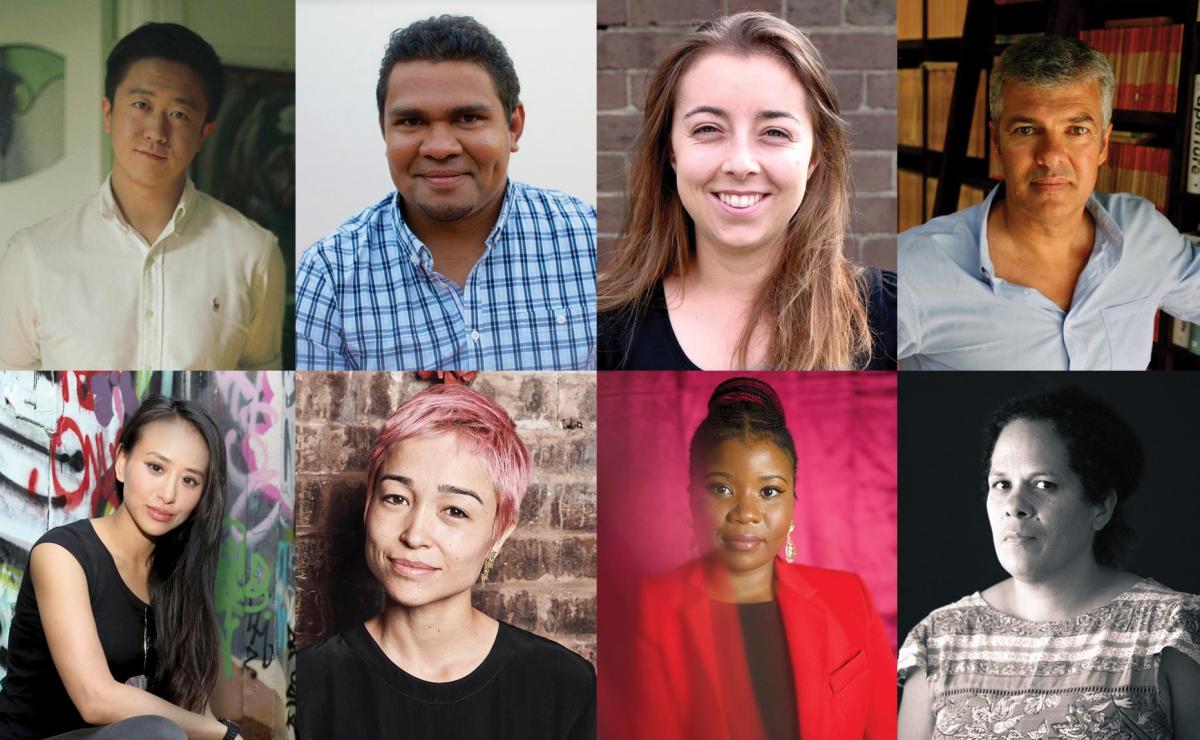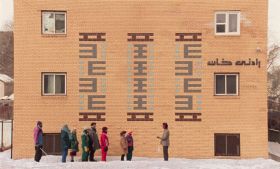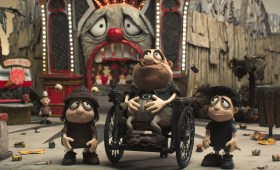The Australian Arts community has been doing it tough this year, and eight filmmakers have been invited to make short documentaries (five minutes or less) focusing on artists and the performing arts during this time of COVID-19.
Voxdocs is a new initiative from the Shark Island Institute, headed up by filmmaker and philanthropist Ian Darling (The Final Quarter, Paul Kelly – Stories of Me), and Documentary Australia Foundation, in association with the Sydney Morning Herald and the Age.
The films will be available to view on the SMH and Age websites from 3 October as part of The Good Weekend’s Art & Culture issue published on that date. The documentaries will be supported by long form journalism.
Screenhub spoke to Darling as he was driving out of Kangaroo Valley, Shark Island’s residential hub deep in the NSW bush. He said the project had been pulled together in about three months and it came out of conversations he was having with Lisa Davies, the editor of the SMH, and Katrina Strickland at Good Weekend.
‘We were talking about the model of bringing together philanthropy with journalism and filmmaking. I was drawn to the New York Times ob docs where they have these short films. We were talking about the notion of how how powerful it could be if the films and the journalism were all around one specific theme.’
‘Let’s bring the attention back to the single artist who’s actually there without any support, still struggling to make art and feeling undervalued.’
Ian Darling
At the time, it was becoming clear how disastrous things were for artists and performers, many of them excluded from JobKeeper and JobSeeker assistance. ‘I felt very helpless about it all,’ said Darling, who is without a doubt one of the most proactive people in the sector.
He is, after all, the man behind social justice documentary fundraising and advocacy organisations Shark Island Institute, DAF and Good Pitch Australia.
‘So I thought let’s bring the attention back to the single artist who’s actually there without any support, still struggling to make art and feeling undervalued.’
The first step was to go to a couple of filmmakers who had already worked with Good Pitch Australia, Maya Newell (Gayby Baby, In My Blood it Runs) and Hollie Fifer (The Opposition). ‘I really sought their advice and said, “if we did this, and provided $10,000 to each project, along with some additional support and services, what do you think?” And they gave great feedback and jumped at the idea of being part of it themselves. Then we went out to some Indigenous filmmakers and some other diverse voices.’
Read: Evolving industry support for vulnerable members
Darling himself contributed one of the films, and said this was a great exercise in understanding the limitations the other filmmakers were working under.
‘I found out that it’s every bit as difficult, if not more difficult, to tell a story in five minutes as it might be in 25. You’ve got this opportunity to circle around one major theme and a couple of sub themes, and that’s it! Every filmmaker found that difficult, but it was very important, for many reasons, to keep it short. And five minutes was enough to really show their individual voices, and the voices of their subjects, which was key to the whole enterprise.’
Why did they need to be so short? ‘We don’t want the sector to think that you can make a major film for 10 minutes for $10,000 because you absolutely can’t. But you can make a bite-sized one if you get a bit of help in other areas as well.’
This additional support included providing Shark Island providing all the post facilities, the grading, the sound mix and some editing support. This also helped ensure the films shared a similar style, feel and quality.
‘We don’t want the sector to think that you can make a major film for 10 minutes for $10,000 because you absolutely can’t. But you can make a bite-sized one if you get a bit of help in other areas as well.’
Ian Darling
All eight films explore how artists are faring, the contributions they’re making and the things that are lighting them up during isolation. Each film ends with a specific call to action about how viewers and readers can support the artists in the film and the performing arts sector more generally.
The filmmakers are: Maya Newell, Hollie Fifer, Ian Darling, Santilla Chingaipe (Black as Me), Alex Wu (winner of Dendy Award for Best Australian Live-Action Short Film at the 2020 Sydney Film Festival for Idol), Tamara Whyte (recipient this year of the Inaugural Centralised Documentary Australia Foundation Fellowship), Maria Tran (actor, filmmaker, martial artist) and Cornel Ozies (Our Law).
Quoted in the Media Relase, Darling said:
In these most difficult of times, when our ability to experience performing arts has been curtailed and when our artists are struggling financially and for meaning, this series of films is a timely exploration. It’s a series about both loss and resilience, it’s a celebration of artistic expression and the gifts our artists give to the community and, we hope, the films will kickstart a conversation about how we can better support and appreciate the performing arts in Australia.
This initiative is very much an experiment, but Darling said if it works, there’s the opportunity to do more themed films at the intersection of journalism and documentary.
‘The ideal outcome is that you can see how you can have many voices and opinions in different forms, and how the documentary form can work so well with journalism, and each can inform and enhance the other.’
Specifically, in this instance, he said he hopes that the power of film can help to put a face on complex issues. ‘I hope audiences will get a sense of who it is that makes up the performing arts community and how diverse it is, and how much of a struggle it is for everyone, and how important it is. So at the very least we place even greater value on the importance of artists.’
The Voxdocs Films
PLAYLIST, Maya Newell
A short documentary about ‘a Tongan/Arabic Australian whose body still moves to the dance routines of her first breakout show, PLAYLIST before it was cancelled. Covid19 came without invitation, but the pause and stillness sparked Neda to question how she can represent her culture when she still has so much to learn.’
Verse, Cornel Ozies
Verse follows spoken word and slam poet Hani Abdile, who fled the civil war in Somalia aged just 16 and made her way to Australia by boat where she spent 11 months detained on Christmas Island and began writing poetry.
Filmmaker Cornel Ozies is a Djugun, Yawuru, Gooniyandi and Jabirr Jabirr man from the Kimberley region of Western Australia and an AFTRS graduate who has made numerous projects for NITV, SBS and the ABC as well as four series of the Kriol Kitchen cooking show. His documentary Our Law premiered at the Sydney Film Festival in 2020 and his documentary short Footprints premiered there in 2015.
In his director’s statement for Verse, Ozies said: Hani’s journey highlights the importance of grass roots organisations like Word Travel who develop and nurture new talent. Small arts organisations provide a platform for emerging artists to hone their craft and gain exposure. Without them we, as a society, risk losing unique stories like Hani’s.’
My Mother the Action Star, Maria Tran
Tran is an actor, filmmaker and martial artist working across video, performance and action choreography with credits including Roger Corman’s Fist of the Dragon, Chinese mixed martial arts movie Death Mist and Vietnamese blockbuster Tracer. In 2018, she received the Create NSW Western Sydney Arts Fellowship award and established a female led film and art collective, Phoenix Eye, based in Western Sydney. Her doco came out of the experience of having her solo theatrical show shut down, which led her to look closer to home and interview her mother.
In her director’s statement, Tran says: ‘My mother, Betty Thi Tran, was a private woman until making this documentary. Making this film was a deeply personal moment that has led me to connect more with the harrowing life and death Vietnamese diasporic journey via boat to Australia and how I can, as a performing artist embody some of these moments.’
Gove Arts Theatre, Tamara Whyte
Tamara Whyte’s Gove Arts Theatre is a short documentary focusing on a small community arts theatre in Nhulunbuy in the Northern Territory.
Whyte, a descendant of the Warrgamay peoples of coastal far north Queensland and Cane cutters from Vanuatu, lives in Nhulunbuy and works across film/video, photography and photomedia.
In her director’s statement, she said of her film: ‘Community Arts offers people the chance to come together and connect for the better of those in their near vicinity, it has a different voice in the conversation but one that mirrors what is happening all over the country. Within our own NT Covid bubble, Gove Arts Theatre offered the community a reminder of how valued the Arts are to them and the joy that comes from bringing people together.’
A Reminder, Alex Wu
Alex Wu is an award-winning Australian filmmaker based in Melbourne whose short films Beneath the Cotton Clouds (2014), Freight Train (2014) and Motown (2015) have screened at international festivals including the BFI London Film Festival, Edmonton International Film Festival and the Barcelona Film Festival, and his most recent work, Idol (2019), took home the Dendy Award for Best Australian Live-Action Short Film at the 2020 Sydney Film Festival and is nominated at the 2020 Australian Directors’ Guild Awards.
Using animation, A Reminder focuses on Chinese-born Melbourne-based actor Kyle Chen, who Wu had previously worked with. In his director’s statement, Wu says: ‘I was dismayed to hear that he had previously almost given up on his dream due to a lack of opportunity, despite the clear abundance of his skill and talent.
‘aking a short documentary during Stage 4 lockdown came with an obvious set of restrictions. To circumvent this, we decided to tell the story through animation. I collaborated with three Melbourne-based animators – Rowena Lloyd, Sylvie Le Couteur and Robbie McKinstry – to each interpret a third of the story in their own unique style, and transform Kyle’s narrative into a vivid dreamscape, portraying the emotions and array of colours encapsulated in becoming different characters and telling stories. It ended up being a hugely satisfying creative experience from beginning to end and complemented the intended thesis of art as an expression of the individual.’The Dancer, Santilla Chingaipe
Santilla Chingaipe is a journalist and filmmaker whose work explores migration, cultural identities and politics. She is a regular contributor to The Saturday Paper, and serves as a member of the Federal Government’s Advisory Group on Australia-Africa Relations (AGAAR). She wrote and directed the arts documentary series Third Culture Kids for the ABC and the short documentary Black as Me.
The Dancer asks, ‘What impact does systemic racism have on artists?’ It ‘explores the motivations, dreams and harrowing accounts of racism in the arts industry through the stories of non-white creatives and interpreted through a dance choreographed and performed by acclaimed Congolese-Australian burlesque dancer, choreographer and performing artist, Zelia Rose. It asks the sector to actively work to dismantle racism which has long lasting impacts on creatives.’
Unbalanced, Hollie Fifer
Hollie Fifer’s debut feature documentary The Opposition had its world premiere at Hot Docs and IDFA in 2016 before winning the Grand Prize at FIFO, screening at the UN Human Rights Council, winning Best Documentary Feature at the Oz Flix Independent Film Awards and screening in over 35 countries.
Unbalanced follows performance artists Will and Garrett Huxley, who are stuck in their apartment during Melbourne’s second-wave coronavirus lockdown. ‘Their antidote to boredom, frustration and anxiety may look slightly different to most. Partners in life and work, Will and Garrett intimately film themselves as they navigate their cabin fever and search for an escape through their art. They discover that their glitter-submerged creativity is their lifeline as the importance of art and creativity in dark times becomes paramount.’
The Comedian, Ian Darling
The Comedian features Darling’s long time friend and standup comedian Greg Fleet as he deals with the shut-down of venues, the lack of live laughs and his mortality as a performer. In his director’s statement Darling said: ‘I wanted to examine how a stand-up performer would operate without an audience, and explore the consequences of shut down. We hastily gathered our favourite documentary film crew, and over a day and night of filming in the Upper River Community Hall at Kangaroo Valley, the documentary emerged.’





